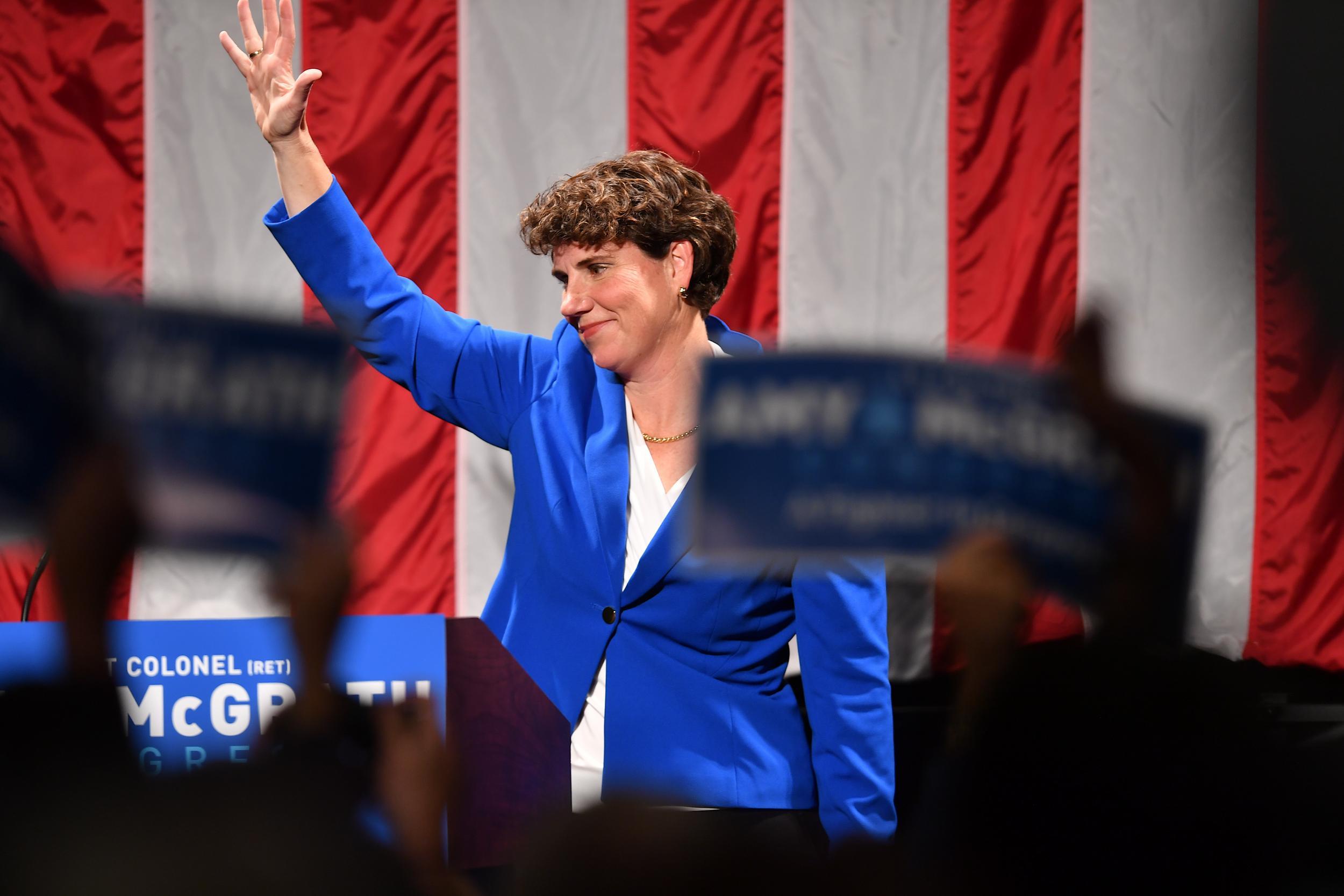Can money buy Senate seats? Democrats intend to find out
Analysis: To win a House or Senate seat, candidates must first and foremost resonate with voters and prove to them that they represent their values, writes US political correspondent Griffin Connolly


When Kentucky Senate candidate Amy McGrath was declared the victor over progressive insurgent Charles Booker in the Bluegrass State’s Democratic primary earlier this month, major party donors and leaders exhaled a huge sigh of relief.
With the backing of Senate Minority Leader Chuck Schumer and Democrats in Washington and their deep-pocket connections, Ms McGrath, a retired US Marine Corps fighter pilot, has raised $47.3m for her campaign to unseat Majority Leader Mitch McConnell, the most money of any congressional candidate this cycle.
She’d beaten Mr Booker by less than 3 percentage points, despite outspending him by nearly $27m since declaring her candidacy last year.
Mr Booker, who is black, surged in the final weeks of the primary race as urban Democratic voters were energised by the recent deaths in police custody of George Floyd in Minneapolis, Breonna Taylor in Louisville, and others.
The near-upset in Kentucky served as yet another stark reminder for Democratic campaign strategists that flooding congressional races with money has diminishing returns.
You might be able to eke out primaries by outspending an opponent, but you cannot purchase federal elections.
To win a House or Senate seat, candidates must first and foremost resonate with voters and prove to them that they represent their values.
“Money helps, but it's not a panacea,” said Amy Steigerwalt, a professor of political science at Georgia State University who has analysed several of these races.
“It cannot erase already unfavourable views of a candidate ... overcome existing partisan splits ... or completely upend a race that already has a solid set of candidates,” she said.
Lessons of the past
Democrats must net a four-seat pick-up or a three-seat pick-up plus the presidency — the vice president can vote to break ties in the upper chamber — to take back a majority this fall.
Although every Democratic establishment-backed candidate has won his or her primary so far this cycle — a strong indicator that their “electability” messages have resonated with most primary voters so far — some are bound to lose to their Republican opponents in November.
It won’t be the first time financially potent Democrats have lost.
In 2018, then-Congressman Beto O’Rourke of Texas broke record after record as he amassed more than $80.3m in his bid to put GOP Senator Ted Cruz out of a job.
But while the Lone Star State has slowly trended away from Republicans in recent cycles, they’re still the dominant party. Mr Cruz, who raised a little more than half of Mr O’Rourke’s total, won by 2.6 percentage points on Election Day.
A similar dynamic played out in the 2017 special election for an open seat in Georgia’s 6th congressional district, where Democrat Jon Ossoff raised more than $30m in an attempt to flip the traditionally conservative House seat blue.
After Donald Trump carried the district the previous fall by just 1 percentage point over Hillary Clinton, Democrats saw the special election there as an opportunity to prove they could win in historically hostile areas for the party’s candidates that appeared to dislike the president’s brand of politics.
Mr Ossoff lost the election to Republican Karen Handel, who raised less than a third of the amount of money as him.
Mr Ossoff and Mr O’Rourke simply could not surmount the prevailing GOP-leaning sentiments of their constituencies, despite incredible monetary advantages, Ms Steigerwalt said.
Why money matters
Money is still important, though, if you harbour any realistic ambitions of ousting a longtime incumbent, especially in the Senate.
To compete in a statewide race, candidates must purchase advertising time in several media markets; cover a whole state with staff and volunteers, not just a singular congressional district; and develop a more robust strategy for get-out-the-vote efforts once voting, including early voting, begins, Ms Steigerwalt said.
Democratic donors both large and small aren’t pinching pennies this cycle: Four of the top seven congressional fundraisers are Democratic challengers for Senate.
Ms McGrath is first, followed closely in second by retired astronaut and gun control activist Mark Kelly, who is challenging GOP Senator Martha McSally in Arizona and has raised $44m in that effort.
Ex-South Carolina Democratic Party Chairman Jaime Harrison has raised $29m in his bid to take down Republican Senator Lindsey Graham, a figure good for fifth. And Maine House Speaker Sara Gideon has hauled in $24.2m in her race against GOP Senator Susan Collins, placing her seventh on the list of fundraisers.
Those impressive fundraising hauls have helped some of them level the playing field, as Ms Gideon’s and Mr Kelly’s races are rated as Tossups by all the preeminent elections handicapping websites.
Even the sheer numbers appear to have invigorated some voters, providing further proof, in their estimation, that Democratic challengers can win in November.
"She has the backing right now, the money backing,” one Democratic primary voter in Maine told a local ABC News affiliate in Maine last week after exiting his polling place that he voted for Ms Gideon.
“And that, I think, is going to be the best chance to beat Susan,” the voter said.
Join our commenting forum
Join thought-provoking conversations, follow other Independent readers and see their replies
Comments